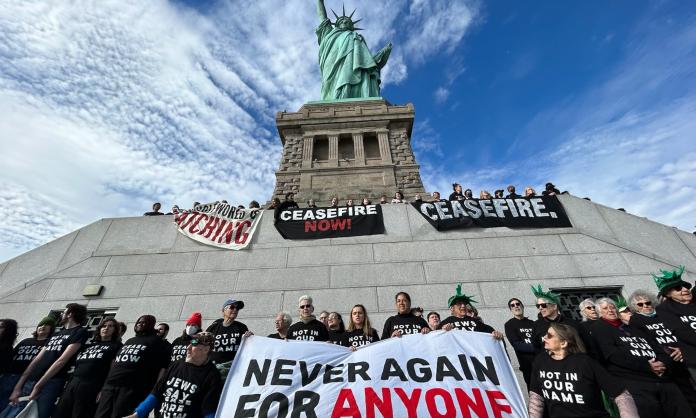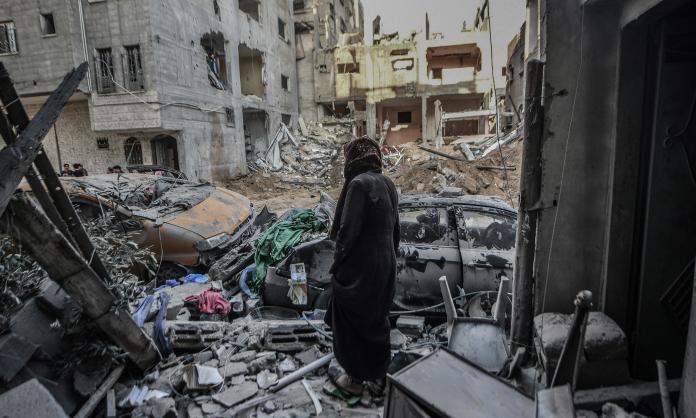“Never again for anyone” was the slogan on the banner, and “Not in our name” on the mass of black T-shirts, when hundreds of Jews took over the base of the Statue of Liberty to demand freedom for the Palestinians and an end to the bombardment of Gaza.
It was one of dozens of rallies, mass occupations and sit-ins organised by Jewish Voice for Peace, some ending in hundreds of arrests. The group, founded in 1996, now claims to have 70 branches across the US, and since 7 October has played a prominent role in international Palestine solidarity.
Defenders of Israeli war crimes depend heavily on promoting the idea that only racial hatred of Jews could lead anyone to protest for the Palestinians: pro-Palestine rallies, we are told, are anti-Jewish “hate marches”. By bringing together US Jews for mass, disruptive public actions in solidarity with the Palestinians, these protests explode that lie.
Jewish opposition to Zionism isn’t new. It took the combined impact of the Holocaust and Stalinism to allow the Zionist colonial project to become the dominant force in Jewish politics, and ever since, there have been Jews who have rejected it and stuck with internationalist, anti-imperialist principles. For decades, they have been relatively marginalised, isolated and targeted for frenzied attacks by Zionist institutions and right-wing activists. Large-scale Jewish institutions have mostly remained solidly Zionist.
That has contributed to the impression that all Jews support Zionism, and that solidarity with Palestinians is a form of anti-Semitism. But as a growing cohort of young Westerners rightly come to see anti-Zionism as a principled extension of basic anti-racist principles, the defenders of Israel have had to resort to increasingly absurd measures to maintain the fiction, as when the British Labour Party suspended or expelled swathes of Jewish activists for “anti-Semitism” a few years ago.
US Jews have a particularly important role to play. The US is the world’s most important backer of the Zionist project. About as many Jews live in the US as live in Israel, so US Jews have an important capacity to shape and influence world perceptions of Jewish politics. In the early 20th century, when many European Jews were strongly influenced by socialist ideas, the vast majority of those who fled European anti-Semitism settled in the US, not Palestine. That contributed to a powerful and deeply-rooted tradition of Jewish leftism, anti-imperialism and anti-racism in the US.
Those ideas are clearly incompatible with the principles of Zionism, but for decades the contradictions have been more or less successfully papered over in different ways by Zionist Jewish institutions, liberal Zionism and the dominance of the ultra-imperialist Democrats in what passes for American “leftism”. Now the contradictions are becoming harder to ignore, as mainstream Israeli politics becomes more openly fascistic and genocidal and some young Americans shift to the left. The sheer size of the US’s Jewish population means anti-Zionist Jews can work together and organise bigger actions more easily: they are harder to ignore and can be an inspiration for anti-Zionist Jews around the world.
Jewish Voice for Peace is refreshingly straightforward in its statement on Zionism: “Jewish Voice for Peace is guided by a vision of justice, equality and freedom for all people. We unequivocally oppose Zionism because it is counter to those ideals”. This clarity reflects a change that has taken place in the last decade. At its founding, the group was agnostic on Zionism; it adopted its current anti-Zionist position in 2014, after years of active involvement in Palestine solidarity work had made it impossible to equivocate on the question of principle.
This marks an important break. Many Jewish groups that express some sympathy for Palestinian human rights have been reluctant to criticise Zionism itself, and by refusing to do so, they have contributed to the idea that to “deny Israel’s right to exist” is a form of extreme, Nazi-esque racism.
But although the reprehensible right-wing politics of the current Israeli government have made it psychologically easier for many young Jews to renounce support of Israel, the current massacre in Gaza and the theft of Palestinian land don’t come from the ultra-right politics of the Israeli government. They are the logical conclusions of the colonial ideology of Zionism itself, and to fight for Palestinian human rights without rejecting Zionism is like campaigning for racial equality in South Africa without rejecting apartheid.
Even if most US Jews have not yet reached that conclusion, the evidence suggests a major transformation is under way. A surprising 2021 poll by the Jewish Electoral Institute found that a whopping 38 percent of US Jews under the age of 40 consider Israel to be an apartheid state. The current massacre has forced the Palestine question to the forefront of politics, and many more Jews will now be reconsidering where they stand. In that context, the actions by Jewish anti-Zionist groups can have a major impact.
The sheer size and impeccable Jewish pedigree of the Jewish Voice for Peace actions has not stopped Zionists from using their usual tricks to slander and repress them. The right-wing rag, the National Review, calls it the “Anti-Jewish Jewish Voice for Peace”, and directly accused the organisation of anti-Semitic racial hatred. The super-Zionist Jewish group, the Anti Defamation League, has included the Jewish-led sit-ins and occupations in its statistical tally of rising “antisemitism” in the US; the ADL’s CEO described Jewish Voice for Peace as a “hate group”. At Columbia University, the Jewish Voice for Peace chapter has been suspended for organising pro-Palestine activism, as has the Students for Justice in Palestine group.
That banning shows the value of Jewish Voice for Peace and anti-Zionist activism by Jews. Ultimately, Jews are not very important to the actions of the Israeli state and its Western backers. The IDF does not base its bombing campaigns on Jewish global opinion, and the US government does not redeploy aircraft carriers to the Middle East because it cares about the wellbeing and safety of Jewish people. For Western imperialist planners, Jews are only an ideological prop to justify imperialism and colonialism. As long as they can pretend that anti-Zionism is a form of racial hatred, they can pretend that Western imperialism is a form of anti-racism, and they can more easily slander and repress anyone who tells the truth about Zionist war crimes.
By fighting alongside non-Jewish anti-Zionist groups, Jewish Voice for Peace and groups like them make that a little bit harder. By occupying and protesting and even by being banned, these Jewish activists prove that the political polarisation is not a racial one pitting anti-Semites against Jews. It is a political battle, in which the supports of Western imperialism are being challenged by an international solidarity movement, and those divisions exist within every racial and religious group. One young Jewish activist lost touch with her father after he saw her being arrested at a pro-Palestine action: he said she had betrayed the memory of her grandparents, who were Holocaust survivors. “He is acting from a place of wanting to protect the Jewish people and honour his parents’ legacy”, the young woman told the Philadelphia Inquirer. “And so am I. We’re just going about it in very different ways.”







